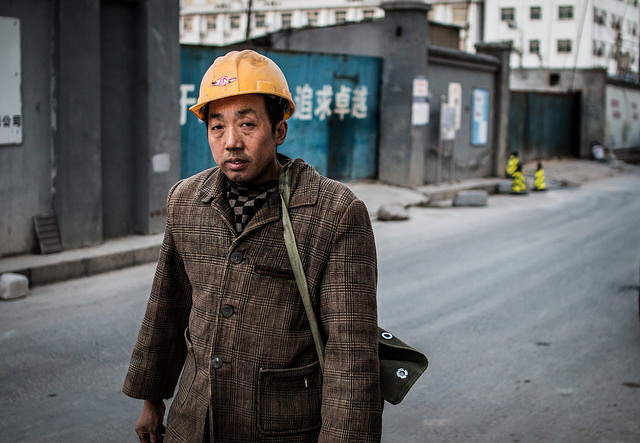The Word of the Week comes from the Grass-Mud Horse Lexicon, a glossary of terms created by Chinese netizens and encountered in online political discussions. These are the words of China’s online “resistance discourse,” used to mock and subvert the official language around censorship and political correctness.

“I’m this cute, how can I be ‘low-end’?” (Source: Weibo)
dīduān rénkǒu 低端人口
low-end population
A term originally used in official media reports and policy documents to refer to people who work low-pay, low-skill service jobs. The term blew up in netizen discourse amid a 40-day crackdown on illegal dwellings that evicted thousands of migrant workers in Beijing. As of November 30, 2017, the term is a sensitive word on Weibo, and is also blocked on WeChat. Some have adopted the term as a self-deprecating label akin to “fart people” (pì mín 屁民) or “loser” (diǎosī 屌丝), now proudly worn on clothing and overseas social media avatars.
Following a deadly fire in a textile manufacturing district in southern Beijing on November 18, authorities launched a 40-day crackdown on unsafe dwellings and immediately issued censorship directives ordering Chinese media to follow official coverage of the fire. The ongoing crackdown has resulted in eviction for tens of thousands of migrant workers in the city, which according to the South China Morning Post, “sharply accelerated the authorities’ drive to move migrant workers out of the city as it tries to cap population growth.” While middle class renters have also been caught up in the evictions, the disproportionate number of migrants affected by the campaign has stoked public outrage.
While discussing the migrants impacted by the safety drive, netizens recalled usage of the term “low-end population” in statements and media reports, criticizing the government for an unjust approach to migrant laborers long seen in policy and demonstrated by the term’s usage. A Chinese report from the BBC noted that official Chinese media began using the term in late 2010, continuing to use it when quoting experts on how policy efforts to slow down population growth were driving the “low-end population” out of the cities.
An official denial that the campaign is targeting Beijing’s “low-end population” exacerbated public focus and outrage over the ongoing crackdown. As netizens continued to recall the term and comment negatively on the government’s response to the fire, a leaked censorship directive translated by CDT ordered all websites to shut down special coverage of the crackdown on unsafe dwellings and regulate reader comments, and forbid print and non-local media from independent coverage.
China Media Project describes netizen research on the term’s official usage as authorities attempted to manage the public opinion crisis, noting that the term is shorthand for another with “extremely discriminatory connotations”:
A[s] Chinese internet users cast about for answers, one gathered together documents from district governments across Beijing, including Shijingshan District (石景山区), Haiding District (海淀区), Fangshan District (房山区), Shunyi District (顺义区), and Changping District (昌平区) and found that all of them used phrase like “clear away and regulate the low-end population” (清理整治低端人口), and “control the low-end population” (控制低端人口).
One document in particular from Shijingshan District — dated to March 2017 and bearing the gargantuan title, “On the Implementation of Plans for the National Economy and Social Development in 2016 and 2017 Draft Plan for the National Economy and Social Development”— spoke of “relying on targeted actions to clear away disorder and carry out high-end building, clearing away and regulating 480 courtyard areas where the low-end population congregates.”
Dig a bit deeper, however, and you find that Party media played a crucial role in popularizing the phrase “low-end population.”
According to Hong Kong’s Ming Pao Daily, “low-end population” is a shortened form of the much longer phrase “participants and employees in low-end industries” (低端产业从业与就业者), which has extremely discriminatory connotations. [Source]
While covering the evictions on November 27, CDT editors were able to access a document using the term on the government website for Beijing’s Changping District. As of Novermber 30, the webpage had been taken offline, but is viewable via the Wayback Machine internet archive.
The Chinese term “低端人口” is currently blocked from Weibo search results, with search attempts rendering the standard disclaimer “according to relevant laws and statutes, ‘low-end population’ search results will not be displayed” (根据相关法律法规和政策,“低端人口”搜索结果未予显示). Searches for the corresponding pinyin “diduan renkou” or the English translation “low-end population” were displaying results as of November 30. On November 30, “低端人口” was the number 2 trending search term on FreeWeibo, where many censored comments from the week have been archived. Some bid farewell to the marginalized migrants of Beijing amid the campaign:
MuZiLaoLong (@木子老龙): Goodbye, low-end population.
木子老龙:再见,低端人口。(November 26, 2017) [Chinese]
While others expressed sympathy:
LiangDongDeWeibo (@梁冬的微博): Low-end population [tears]
@梁冬的微博: 低端人口[泪] (November 26, 2017) [Chinese]
ZuozheHaiLing (@作者海菱): Every generation of migrant in history shed blood and tears in sadness, and none of them ever mixed with the high-end, never really had the ability to become high-end, following their ancestors in their lack of prosperity—in all empires and all generations, they’ve all faced vicissitudes. These so-called “low-end populations,” they’re all trying their utmost to live, they all have tenacity and vitality! Respect these people as you respect yourself. They’re strangers following the rules in a strange land, with magnanimous conduct, recognizing their own poverty. When they were told to go the other day they left without reluctance—that is genuine dignity.
@作者海菱: 每一代移民史都伴着血泪和心酸,没谁一开始就混的多么高端,真正能够成为高端,祖辈一直兴旺发达的没有,各朝各代,都是变迁。所谓低端人口,他们也在拼命活,他们也有顽强生命力!尊重他人,尊重自己。外地人在异乡守规矩,坦荡做人,承认自己穷,那天说走就走,不留恋,才是真正的尊严 (November 27, 2017) [Chinese]
Others commented on the varying societal issues currently afflicting members of different classes in Beijing: the evictions facing the migrant class, the child abuse scandals affecting the middle-class, and the relative privilege enjoyed by those in the upper-class:
YiminTouziZhuanjia (@移民投资专家) Reportedly, this is how people are to greet one-another moving forward: if you see a member of the low-end population, ask: “Do you have a place to live?” If you see a member of the middle-end population, ask: “Are your children alright?” If you see a member of the upper-end population, ask: “There’s nothing wrong for you, right?”
@移民投资专家:据说以后见面都是这样子问候: 低端人口见面问:住的地方没事吧? 中端人口见面问:孩子没事吧? 高端人口见面问:你没事吧? (November 26, 2017) [Chinese]
On Twitter, scholar of modern Chinese history Jonathan Henshaw translates a similar joke as told by Australia-based Chinese novelist Yang Hengjun:
https://twitter.com/JDBHenshaw/status/934675226096488449
A folk painting and poem for the migrants evicted in Beijing by feminist activist Ye Haiyan, aka Hooligan Sparrow, has also been circulating on Twitter:
https://twitter.com/haikoudoudou1/status/935807153255858177
Beijing, I’m out
Take pity on the low-end population
No money to be made tilling the rural soil
Working in the big city is so f***ing exhausting
Leaders happily and casually expel them
– Winter 2017, Haiyan in Beijing [Chinese]
For more in-depth reporting on the illegal building crackdown—including many photos of razed sites and a summary of recent policies aimed at limiting migration to Beijing (largely unsuccessfully as the city’s service industry depends on them)—see “Beijing Razes Migrant Neighborhoods, Evicting Tens of Thousands” from The New York Times’ Chris Buckley. For more examples of censored Weibo and WeChat posts referencing the “low-end population,” see a collection compiled by CDT Chinese editors.








